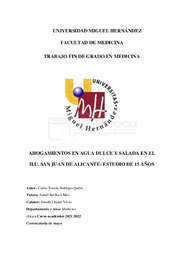Por favor, use este identificador para citar o enlazar este ítem:
https://hdl.handle.net/11000/28843Ahogamiento en agua dulce y salada en el H.U. San Juan de Alicante: Estudio de 15 años
| Título : Ahogamiento en agua dulce y salada en el H.U. San Juan de Alicante: Estudio de 15 años |
| Autor : Noblejas Quiles, Carlos Tomás |
| Tutor: Betlloch Mas, María Isabel Chiner, Eusebi |
| Editor : Universidad Miguel Hernández de Elche |
| Departamento: Departamentos de la UMH::Medicina Clínica |
| Fecha de publicación: 2022-05-19 |
| URI : https://hdl.handle.net/11000/28843 |
| Resumen : Introducción y objetivos: En la actualidad, el ahogamiento se considera una de las principales causas de muerte accidental a nivel mundial. Las series publicadas acerca del ahogamiento en agua dulce y salada son escasas y existen pocos datos al respecto en España. Nuestro objetivo es valorar los casos de ahogamiento atendidos en nuestro Departamento de Salud, evaluando su comportamiento clínico y fisiopatológico, así como estudiar la influencia de los corticoides sobre el curso de la enfermedad. Material y métodos: Se analizaron retrospectivamente durante un período de 15 años todos los casos de ahogamiento ingresados en el Hospital Universitario San Juan de Alicante, situado en un área mediterránea. Comparamos las variables clínicas y analíticas entre la aspiración en agua dulce y salada y obtuvimos correlaciones entre la edad, el sexo, la necesidad de resucitación y el nivel de conciencia. Además, se comparó la analítica sanguínea, gasometría arterial, radiología, estancia media hospitalaria, evolución clínica, tratamiento y pronóstico según el lugar del ahogamiento. Resultados: Se estudiaron 77 hombres (71%) y 32 mujeres (29%), con una edad media de 51 ± 27 años. Los pacientes fueron divididos en: grupo A) agua salada (72%) y grupo B) agua dulce (28%). Se encontraron diferencias estadísticas en la edad (A: 57 ± 22 vs B: 35 ± 33, p <0,001), hemoglobina (A: 15 ± 2 vs B: 13 ± 2, p<0,002), hematocrito (A: 45 ± 8 vs B: 40 ± 5, p<0,001), pH (A: 7,2 ± 0,2 vs B: 7,3 ± 0,1, p<0,001), HCO3 (A: 16 ± 6 vs B: 21 ± 5, p<0,001), PaO2/FiO2 (A: 316 ± 148 vs B: 223 ± 98, p<0,034) y RCP por Equipo de Emergencias (A: 23% vs B: 45%, p<0,039). No se observaron diferencias en el patrón radiológico, siendo el más frecuente el alveolar difuso bilateral (44%). No hubo diferencias significativas en las complicaciones excepto en el SDRA (A: 1% vs B: 10%, p<0,035); a destacar la neumonía bacteriana que fue ligeramente más frecuente en el grupo A (15% vs B: 13%). Fueron ingresados directamente en UCI 43 pacientes, de los cuales 19 (44%) precisaron ventilación mecánica, 26 (60%) antibioterapia y 20 (47%) corticoides, observándose, en estos últimos, una tendencia a la reducción de la estancia media en UCI, aunque la estancia media total hospitalaria no mostró diferencias. Dos pacientes murieron y 4 desarrollaron daño neurológico permanente. Conclusiones: En nuestra serie la morbilidad y mortalidad de los que llegan al hospital con ahogamiento fue baja, siendo más frecuente en agua salada. Los esteroides podrían reducir el tiempo de hospitalización en UCI, pero no parecen modificar significativamente la estancia hospitalaria total. Introduction and objectives: Nowadays, drowning is considered one of the world´s leading accidental causes of death. The published studies about freshwater and saltwater drowning are rare and there are a few data in this regard in Spain. The objective of this project is to assess the drowning cases attended in our Health Department, evaluating their clinical and physiopathological behaviour and studying the corticosteroids influence in the disease course. Materials and methods: During a period of 15 years, all the admitted drowning cases in the Hospital of San Juan, placed in a Mediterranean area, were analyzed. We compared the clinical and analytical variables between freshwater and saltwater inhalation, getting correlations between age, gender, resuscitation necessity and conscience level. Moreover, blood test, arterial gasometry, radiology, average hospital stay, clinic evolution, treatment and prognosis were compared depending on the drowning place. Results: For this study 77 men (71%) and 32 women (29%) cases were analyzed, with an average age of 51 土 27. Patients were divided in two groups: Group A) saltwater (72%) and group B) freshwater (28%). Statistic differences were found in ages (A: 57 ± 22vs B: 35 ± 33, p <0,001), hemoglobin (A: 15 ± 2 vs B: 13 ± 2, p<0,002), hematocrit (A: 45 ± 8 vs B: 40 ± 5, p<0,001), pH (A: 7,2 ± 0,2 vs B: 7,3 ± 0,1, p<0,001), HCO3 (A: 16 ± 6 vs B:21 ± 5, p<0,001), PaO2/FiO2 (A: 316 ± 148 vs B: 223 ± 98, p<0,034), CPR by emergency health workers (A: 23% vs B: 45%, p<0,039). There were no differences in the radiological pattern, being the most common one the bilateral diffuse alveolar (44%). There weren't any meaningful differences in complications except for the ARDS (A:1% vs B:10%, p<0,035); remarking the bacterial pneumonia being slightly more frequent in group A (15% vs B: 13%). There were 43 patients who were directly admitted in the ICU, 19 of which (44%) needed mechanical ventilation (respiratory support), 26 (60%) antibiotic therapy and 20 (47%) corticoids, noticing a tendency to reduction in the average ICU stay in the last group, even though the average hospital stay showed no difference. Two patients died and 4 developed permanent neurological damage. Conclusions: This study shows the low morbidity and mortality of the people who arrived at the hospital with drowning, being more frequent in saltwater. Corticoids could reduce hospitalization stay in the ICU but show no significant modifications in the total hospitalization stay. |
| Palabras clave/Materias: Ahogamiento Semiahogamiento Agua salada Agua dulce Corticoides Neumonía Antibióticos Fallo respiratorio agudo |
| Área de conocimiento : CDU: Ciencias aplicadas: Medicina |
| Tipo de documento : info:eu-repo/semantics/bachelorThesis |
| Derechos de acceso: info:eu-repo/semantics/openAccess |
| Aparece en las colecciones: TFG- Medicina |
 La licencia se describe como: Atribución-NonComercial-NoDerivada 4.0 Internacional.
La licencia se describe como: Atribución-NonComercial-NoDerivada 4.0 Internacional.
.png)
